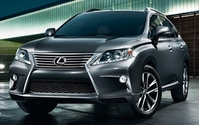
What happened?
Vehicle dependability had been rising like the Hillary Step for the past 16 years. But last year, for the first time, the number of problems people reported in J.D. Power and Associates' benchmark
Vehicle Dependability Study increased by 6%.
In its 25th year, the study assigns a dependability ranking to a model based on the number of problems reported by original owners per 100
vehicles. The lower the score, the higher the quality. Based on a survey last year of 41,000 owners, it involved 2011 model year cars and trucks after 12 months of ownership.
The
study reported an average of 133 problems per 100 vehicles during 12 months of ownership, versus 126 problems measured in last year's study. The firm says this marks the first time since the 1998
study that the average number of problems has increased. This could be a major problem for automakers: J.D. Power's own research shows that the fewer problems owners experience with their vehicle, the
greater their loyalty to the brand.
advertisement
advertisement
The firm says its own research shows that 56% of owners who reported no problems stayed with the same brand when they purchased their next
new vehicle. That dropped to 42% percent among owners who reported three or more problems. And 23% of consumers avoided brands that ranked in the lowest quartile of the 2013 dependability study
because of concerns about reliability. Only 9% of consumers cited that same reason for avoiding brands that ranked in the top quartile.
“By combining our customer research
with trade-in data, we see a very strong correlation between dependability and real-world brand loyalty,” said David Sargent, VP of global automotive at J.D. Power. “Also, we see that
brands with lower dependability are likely to be shut out of a significant piece of the market, as many consumers will not even consider purchasing one of their vehicles because of concerns about its
likely reliability.” He also said most of the problems involved engines and transmission. The study says the quality slippage is particularly acute for vehicles with four-cylinder engines, where
problem levels increase by nearly 10 per 100 vehicles.
Even though its 2011 model-year cars are not involved, and its issues are not explicitly to do with hardware,
Toyota’s just announced global recall of some 1.9 million Prius cars is emblematic of these kinds of challenges. The recall is for a powertrain computer program issue that can lead to the hybrid
engine quitting.
“Automakers are continually looking for ways to improve fuel economy, which is a primary purchase motivator for many consumers, particularly those
buying smaller vehicles,” said Sargent. “However, while striving to reduce fuel consumption, automakers must be careful not to compromise quality. Increases in such problems as engine
hesitation, rough transmission shifts and lack of power indicate that this is a continuing challenge.”
Lexus had the fewest problems among all nameplates, enjoying a big gap
between it and all the others: Lexus only had 68 problems per 100 vehicles versus second-ranked Mercedes-Benz with 104 problems. Cadillac had the third fewest problems, followed by Acura, and
Buick.
General Motors had leaders in eight segments — more than any other automaker. Toyota Motor was second, with seven segment leaders, most of them Lexus vehicles, though
both Toyota and Scion brands are represented. Honda had six model-level awards And Mini Cooper had the fewest problems per 100 vehicles in its segment.